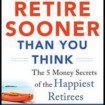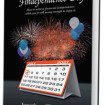Here’s an interesting rule of thumb that most retirees and would-be  retirees would do well to adopt.
retirees would do well to adopt.
The above introductory comments are edited excerpts from an article* by Jonathan Chevreau (findependenceday.com) entitled The $1,000-a-month rule for retirement.
The following article is presented courtesy of Lorimer Wilson, editor of www.munKNEE.com (Your Key to Making Money!), and www.FinancialArticleSummariesToday.com (A site for sore eyes and inquisitive minds) and has been edited, abridged and/or reformatted (some sub-titles and bold/italics emphases) for the sake of clarity and brevity to ensure a fast and easy read. This paragraph must be included in any article re-posting to avoid copyright infringement.
Chevreau goes on to say in further edited excerpts:
This rule of thumb, developed by U.S.-based financial planner Wes Moss, suggests that for every $1,000 in monthly income you want in retirement, you need to have saved $240,000, assuming you are at least 60-years-old (although it would be a useful benchmark even for those younger than 60 and who aspire to an early retirement) and your mortgage has been paid off.
To put the above in specific terms:
- if you want $2,000 a month from your investment portfolio (that is, investment income that is above and beyond pension income, government pensions like Social Security (in the U.S.) or the combination in Canada of CPP/OAS), you need to amass $480,000,
- if you want $4,000 a month from investment income, in addition to the usual alternative sources of income, then you need to have saved almost a million in liquid investments: $240,000 times four is $960,000,
- if you want $10,000 a month, then you’d need $2.4 million, etc.
Moss uses this handy guideline in his practice (a Georgia-based investment firm called Capital Investment Advisor, of which he is chief investment strategist) as well as on his popular financial radio show, Money Matters. It is also his number one tip in his recently published book...You Can Retire Sooner Than You Think: The Money Secrets of the Happiest Retirees.
Investment Advisor, of which he is chief investment strategist) as well as on his popular financial radio show, Money Matters. It is also his number one tip in his recently published book...You Can Retire Sooner Than You Think: The Money Secrets of the Happiest Retirees.
Moss’ rule is based on a 5% annual withdrawal rate, which means that $240,000 in investments would spin off $12,000 a year in some combination of interest, dividends and other income (which Moss calls distributions). Divide the $12,000 by the 12 months of the year and there’s your desired $1,000 a month of income.
(It should be noted here that the above 5% is close to the 4% safe withdrawal rule made famous by financial planner William Bengen who determined that retirees could withdraw 4% a year from a balanced portfolio and not run out of money for at least 30 years.)
Moss suggests that you can get:
- close to 5% in certain high-yielding dividend stocks (telecom or utility stocks for example, even REITs),
- perhaps 2% or 3% from fixed income, depending how much risk you want to take, and
- another 1% to 3% from growth or capital gains on average over the long term even though they can fluctuate or even be negative year by year.
Moss assesses that, while the above approaches may involve cutting slowly into capital in worst case scenarios, as long as your income investments are generating by themselves 3% or 4%, that such nest eggs would easily outlast the average 30-year retirement time frame.


[As a matter of interest below are some quotes from a previous article** by Chevreau entitled How not to go about reirement that outlines the current situation regarding retirement in the U.S. and Canada:
U.S.
- “30% of American have less than US$1,000 in savings and investments
- 75% have less than US$30,000 saved in their retirement accounts…
- 56% have not tried to calculate how much they need for retirement
- average expected retirement age has risen from 60 in the mid-1990s to 67 today…
- 35% over 65 rely entirely on social security for their income and
- 40% of baby boomers plan to work until they die (according to a 2010 AARP survey)”
Canada
- “68% of not-yet-retired Canadians 50 or older have yet to discuss their post-career lives with their partners
- 86% are reluctant to discuss health issues
- 81% don’t want to raise the topic of what happens if one of them dies sooner than anticipated
- 67% haven’t discussed what they will do together in retirement and, astonishingly,
- only 36% have discussed how to finance retirement and where they would live once it occurred. (Source: RBC survey)”
“The way I see it, those of you without a solid savings plan are either going to have to work a very long time into old age or hope for “Freedom Six Feet Under” before you run out of money. To the people who have saved only $1,000 or $30,000, just how long do you expect that money to last? If this is you, perhaps you should take up skydiving, stop exercising, start smoking and eat nothing but junk food.
Either that, or show this blog to your spouse and start having a serious chat about what your joint retirement looks like – and I can tell you from where I currently sit, it can look great, but only if you get serious about it.”]
Editor’s Note: The author’s views and conclusions in the above article are unaltered and no personal comments have been included to maintain the integrity of the original post. Furthermore, the views, conclusions and any recommendations offered in this article are not to be construed as an endorsement of such by the editor.
*http://www.findependenceday.com/cms/2014/08/06/the-thousand-bucks-a-month-rule-for-retirement/ (© 2014 findependenceday.com) **http://www.findependenceday.com/cms/2014/07/23/how-not-to-prepare-for-retirement/
Related Articles:
Loll in the lap of inexpensive luxury at any one of International Living’s 10 best retirement destinations: North America (1); Central America (2); South America (3); Europe (2); Asia (2) Words: 1155 Read More »
2. Want a Secure & Enjoyable Retirement? Here’s Exactly What to Do
Retirement planning is more intimidating for most than any other personal finance topic. We know we should be saving but not how much. We know it’s important to use a tax-deferred account but not which one. Most devastatingly, we often leave saving itself completely up to chance trusting that we will have enough willpower to set money aside for 30-50 years. Luckily, finding a secure and enjoyable retirement need not be mysterious. Here’s exactly what to do. Read More »
3. Retirement Age Keeps Going Up – When Will You Retire?
Just 10 years ago, most Americans felt confident they’d hang up their hat by the time they turned 60. Now the average working stiff expects to retire at age 65 due to the housing crisis and credit crunch, among other nest egg busters….Experts are predicting that the trend will continue, thanks to the Great Recession so, for now, Americans are just focused on keeping their day jobs. When will you retire? Check out the graphic below to find out. Read More »
4. You Might Be Saving TOO MUCH for Retirement – Here’s Why
How much money do you really need to retire on? We’re bombarded with messages about retirement savings – that…we haven’t saved enough; that company pension plans are underfunded; that the Canada Pension Plan [or U.S. Social Security] won’t be able to handle the influx of boomers who are set to retire over the next 10 to 15 years. If that’s you, then you might be panicking right now. Stop! According to a new book retirees may not need as much as they’ve been led to believe. Read More »
5. Coming Retirement Crisis Will Shake America To The Core
The pension nightmare that is at the heart of the horrific financial crisis in Detroit is just the tip of the iceberg of the coming retirement crisis that will shake America to the core. As a society, we have made trillions of dollars of financial promises to the Baby Boomers, and there is no way that we are going to be able to keep those promises. The money simply is not there. Read More »
6. Secure Your Golden Years – Now! Here’s How
Americans spend more time planning their vacations than their retirement and this is the reason why 1 out 7 baby boomers are going bankrupt. With people living longer and spending as much as 30 years in retirement, if you want to maintain a moderate standard of living, it is essential to plan your retirement well in advance to secure your golden years.This article outlines 6 ways to do just that. Words: 665 Read More »
7. 10 Index ETFs for Building an Ideal Retirement Oriented Portfolio
Constructing a portfolio for the retirement years requires one to focus on portfolio risk or uncertainty while not neglecting return. If the portfolio asset allocation plan is too conservative, the return will not meet lifestyle expectations. Inflation is again on the rise and this needs to be taken into consideration when putting together a retirement oriented portfolio. Below is a combination of index ETFs that project respectable returns while holding down portfolio volatility. Words: 455 Read More »
8. Is $1,000,000 Enough to Provide for a Successful 30-year Retirement?
Withdrawing from a $1,000,000 nest egg upon retirement using the familiar 4% rule to generate a successful 30-year inflation-adjusted (3% per annum) retirement proved to be totally inadequate as per the retirement withdrawal strategy that I put forth in a previous article (1). In fact, it crashed and burned in year 25 of the 30-year plan! In fact, as I show in this article, it will only succeed if your portfolio outperforms the S&P 500 by 5% every year for 30 straight years – and what is the likelihood of that? Words: 1533 Read More »
9. Home “Owners”: Here Are 10 Advantages to Paying Off Your Mortgage Early
Paying off the mortgage early is an idea with obvious appeal, but not one that many middle-class home “owners” pursue. If your interest rate is so good that the bank just made a bad bet in giving you that low rate, you might want to continue enjoying the benefits as long as possible. In many other circumstances, however, paying off the mortgage can be a fine money management move indeed. Below are 10 sound reasons to do so. Words: 1588 Read More »
10. Canada is a Great Place to Retire – Here’s Why
While Green Valley – Arizona, Naples – Florida, Ajijic – Mexico or Mendoza – Argentina, or some hidden island in a foreign land, might seem like the dream place to live out the end of one’s life, it turns out that Canadians just might be better off at home and Americans and others should seriously consider emigrating to Canada sooner than later. Here is a brief summary of the reasons why. Words: 842 Read More »
11. Become a Dividend Investor & Retire Comfortably- Here’s How
I invest in dividend paying stocks in order to generate a sufficient income stream that will meet and exceed my expenses in retirement. “Retirement” to me is the point where my dividend income exceeds my annual expenses by 1.5 times, which means that I no longer have to work for money. In order to get there I am following several simple, but crucial, principles [which I would like to share with you]. Words: 830 Read More »
12. Retirement for Most Americans Is Largely a Mirage – Here’s Why
With defined benefit pension plans slowly going extinct and Americans not saving enough for retirement it is becoming tougher for Americans to retire and is setting the stage for a retirement disaster… Read More »
13. The 10 Best Places to Retire in Mexico
Below is an unbiased look at the best places in Mexico to retire – with real pros and cons – to help you make an informed decision as to which best meets your needs, interests and ambitions. Read on! Read More »
14. Retirement Planning: Take This “Life Expectancy” Test
Medical researchers have created a quiz that predicts how long you’re going to live [i.e how many years you will live into retirement – if any!]. It’s called a ‘mortality index‘ and it’s composed of 12 questions. It claims to predict with some accuracy whether you’ll live out the decade. Read More »
15. 10 U.S.Cities With Great Weather for Retirees
Everyone’s interpretation of ideal weather isn’t the same – some want to spend their golden years soaking up the sun, while others prefer a place where they can be near ski slopes. That said, if you’re looking for what most of us would consider pleasant weather—places with plenty of sunshine, low amounts of rain or snow, fewest days below 32 degrees or above 90 degrees and low humidity—these locales came to mind as 10 of the best places in the U.S. to retire if weather is your main concern. Words: 585 Read More »
16. Where Does Your Country Rank as “Best” in World to Live?
Canadians are the second happiest group in the world, after Australia, according to the results of a new study in which citizens of 34 countries were able to rate their own country on the things that made them feel they were experiencing a happy life. Where do the United Kingdom and the United States rank themselves? Read on! Words: 517 Read More »
17. AARP Survey: Golden Years Appear Grim to Aspiring Retirees
An AARP survey of over 5,000 American workers aged 50 or older has confirmed…that the Great Recession has radically changed the financial situation for many aspiring retirees and that the outlook for their golden years now looks grim. It seems that counting on their home equity to finance a life of leisure didn’t exactly work out as planned. [Let’s review the survey’s findings.] Words: 400 Read More »
18. Don’t Even Think About It – Touching Your 401(k) That Is!
Look, if you’re absolutely stuck right now, then you’ve got to do what’s necessary but, in my opinion, you should avoid 401(k) hardship withdrawals at all costs … and think long and hard before you consider borrowing against your future retirement. With so many people nearing retirement already grossly underfunded [such actions are] going to prove catastrophic down the line. Words: 1043 Read More »
19. Americans: Pull Your Heads Out of the Sand Before It’s Too Late!
A demographic stampede is about to pulverize American society. Eighty million retirees—the baby boom generation—are rapidly heading into their retirement years and, according to a recent survey, Americans have less money than ever. Being so unprepared can only mean a very unhappy “retirement” unless they pull their heads out of the sand and do something about it before it is too late. Words: 807 Read More »
20. How Not to Outlive Your Nest Egg
Determine whether you have the time, discipline, and emotional make-up to handle your own finances. Most people think they can succeed on their own, much like the vast majority of people think they are above average drivers. The data shows a different fact pattern. An 18 year study compiled by legendary Vanguard Group founder, John Bogle has shown that the average investor gets destroyed not only by fees, taxes and transactions costs, but also more importantly due to emotional errors and lack of investing discipline. Words: 847 Read More »
21. Is Your Household One of the 51% Projected to be at Risk in Retirement?
Many Americans are reacting to the economic downturn not by resolving to save more but by no longer actively planning for retirement. “That’s exactly the opposite of what they should be doing,’’ said Paul Ballew, senior vice president at Nationwide Insurance. Words: 369 Read More »
 munKNEE.com Your Key to Making Money
munKNEE.com Your Key to Making Money


